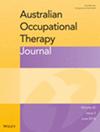Translation, validation, and reliability of the Modified Occupational Questionnaire into Bahasa Melayu among older persons in Malaysia
Abstract
Introduction
A Modified Occupational Questionnaire (MOQ) is a self-report questionnaire that records the occupational engagement of an individual hourly, focusing on activity category, reason for doing the activity, value to self, and value to society. Understanding the patterns of occupational engagement and meaningful time use in older persons is crucial for predicting physical and psychological health and establishing occupation-based interventions to support healthy aging. However, the MOQ, originally developed in an English-speaking country and may potentially be less suitable for Malaysian older persons, who are predominantly Malay-speaking and have distinct cultural adaptations. This study aimed to translate the MOQ from English to Bahasa Melayu and evaluate its validity and reliability among older persons in Malaysia.
Methods
The translation, validation, and reliability assessment process followed guidelines from the World Health Organization, with adaptations from Sousa and Rojjanasrirat's recommendations. The process encompassed five steps: forward translation, harmonisation of the forward translation, backward translation, pretesting and cognitive interviews, and psychometric testing to assess the validity and reliability.
Results
The Malay version of the MOQ (MOQ-M) demonstrated excellent item-level face validity index (I-FVI) and average scale-level face validity index (S-FVI/Ave), both scoring a perfect 1.00. Additionally, it exhibited excellent item-level content validity index (I-CVI) and average scale-level content validity (S-CVI/Ave), with scores ranging from 0.90 to 1.00 and 0.99 to 1.00, respectively. Internal consistency, measured using Cronbach's alpha, surpassed the minimum threshold for good reliability, with all three average scales in MOQ-M scoring between 0.84 and 0.99. Weighted average Cohen's Kappa coefficient revealed substantial agreement in the test–retest reliability across the three scales.
Conclusion
The MOQ-M is a valid and reliable instrument for assessing meaningful time use among Malay-speaking older persons in Malaysia.
Consumer and Community Involvement
There was no consumer and community involvement in this study.
PLAIN LANGUAGE SUMMARY
This study aimed to translate the Modified Occupational Questionnaire (MOQ) into Bahasa Melayu (MOQ-M). The MOQ is a tool used by occupational therapists to understand how unemployed people spend their time and the reasons they are doing it. The translation was necessary because the original version of the MOQ was developed in an English-speaking country and might not be suitable for the Malay-speaking population in Malaysia due to cultural differences. A careful process was followed to make sure the translation was accurate and reliable. The translated version, MOQ-M, was then tested with older persons, most of whom were unemployed, to learn about their daily activities and the reasons for doing them. Understanding their daily routines is important for predicting their health and well-being. The results showed that the MOQ-M worked well, providing useful and consistent information. This means that the tool is reliable and can be trusted to measure how older persons spend their time and what activities are important to them. With this information, programmes can be created to better support older persons, helping them live healthier and happier lives as they age. However, it is important to note that most of the study participants were Malay, so this may not fully represent the different cultural groups in Malaysia.

 求助内容:
求助内容: 应助结果提醒方式:
应助结果提醒方式:


